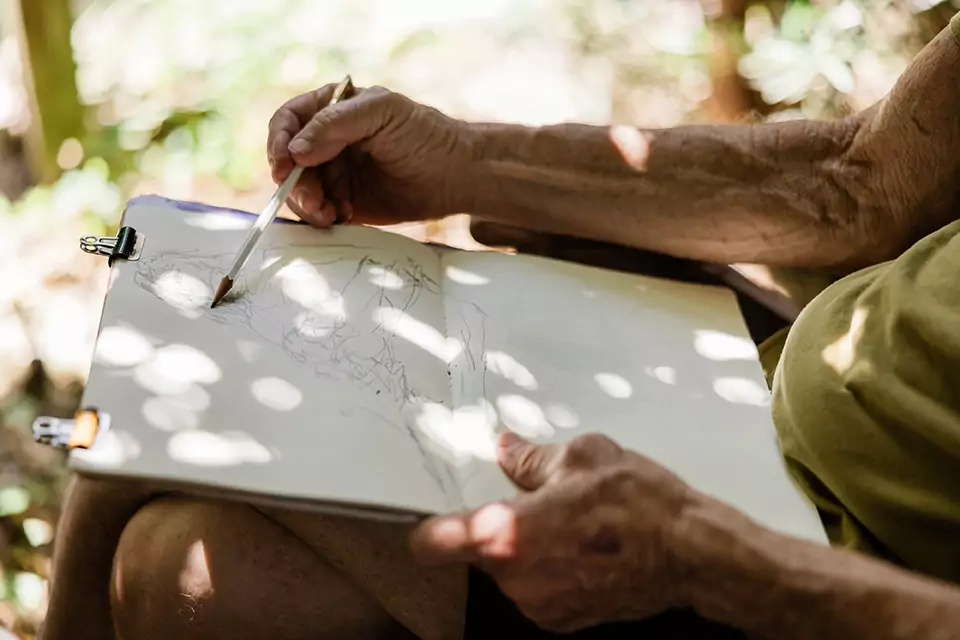Celina Gorre
02 September 2025
Jaime Wolfley was once told by a doctor that she had the heart of an athlete. Three years ago, her heart stopped.
“It was just a normal day,” Wolfley says as she recalls preparing for an evening in with friends when her symptoms started. “I felt this pressure in my chest and an unusual feeling of numbness in my right arm and soon after I couldn’t catch my breath.”
Her story is shared by millions of others. Heart disease can affect women of any age and, globally, it is the leading cause of death for women. But compared to men, women are more likely to be misdiagnosed when they have coronary heart disease, according to the World Heart Federation.
In Wolfley’s case, her symptoms were first thought to be anxiety. She was just moments away from being discharged from the emergency room when she went into cardiac arrest.
Wolfley was diagnosed with a type of heart attack called spontaneous coronary artery dissection (SCAD), in which a tear between the layers of the coronary artery wall obstructs blood flow to the heart. Unlike other types of heart attacks, it is not caused by a build-up of plaque and its exact causes remain unknown. However, studies show more than 90% of incidences of SCAD are in women. It can occur during or soon after pregnancy as well as appearing in individuals experiencing extreme stress. To raise awareness and improve research and medical care of women with heart disease, WomenHeart – a patient-centred organisation, founded in the United States in 1999 – focuses on providing support, education and advocacy for women with, or at risk of, heart disease.
Part of its mission is to achieve equity in heart health which it accomplishes through various initiatives including public education campaigns, both in-person and via app-based peer support networks, and a variety of educational and advocacy events.
The organisation is working towards reconciling gender disparities within cardiovascular conditions by collaborating with medical experts, such as Dr Sharonne Hayes, a cardiologist and professor of cardiovascular medicine at the Mayo Clinic in Rochester Minnesota, technology companies, NGOs and industry partners. Together, they are able to provide a more supportive community for women living with heart diseases, improving both physical and mental health.
The experience of being misdiagnosed is one of the reasons Wolfley applied to be a WomenHeart Champion. “We need to show people it can happen to anybody,” she says.
**
Cardiovascular diseases are a group of disorders that affect the heart and blood vessels. Globally, they are the leading cause of death for both men and women, but they can be stereotyped as a condition that primarily affects men, says Dr Hayes.
The number of younger women, aged 18-49, affected by cardiovascular disease has also increased over the past few decades. However, cardiovascular health inequalities between men and women remain.
Dr Hayes is the medical director of the WomenHeart Science and Leadership Symposium – an event which teaches women either recovering from, or living with a heart condition, how to speak about their experience whilst educating and supporting others on their heart journey. Women who complete the training then progress to become WomenHeart Champions. She also campaigns for greater health equity, noting that women are consistently understudied in medical research on heart disease.
“I felt like I didn’t have the evidence to care for women like I did for men because women have been actively excluded from cardiovascular research for decades. Up until the late 90s and mid-2000s, clinical trials had very few women in them,” Dr Hayes explains. This resulted in a lack of sex-specific evidence.
**
Struggling with fatigue, Charity Watkins visited a doctor twice after the birth of her first child. Despite her test results suggesting the possibility of having a heart condition, initially, she was diagnosed with post-partum depression and sent home.
Watkins’ symptoms did not subside, and after returning from an unsuccessful five-hour stay at the emergency room, she visited her local university-based health centre, where she was admitted to the cardiac intensive care unit. There, it was discovered her heart pumping ejection fraction – a measure of your heart’s ability to pump oxygen-rich blood out to your body – was 5-10%, a healthy score is between 50-70%, meaning she was in heart failure. Watkins was subsequently diagnosed with peri-partum cardiomyopathy.
“I almost lost my life, my daughter almost lost her mom, and my husband almost lost his partner,” Watkins says. “I have a rare condition that could have easily been identified if my symptoms were listened to and taken seriously.”
After struggling to come to terms with her diagnosis, Watkins now looks at her condition with a sense of hope and purpose. “WomenHeart has taught me that time is a non-renewable source – you’ve got to make the most of it when you have it,” she says.
In order to reduce the risk of heart diseases, medical professionals recommend a healthy, active lifestyle. Darlene Scott maintained both her fitness and wellbeing as she prepared for her seventh marathon. So, when she was diagnosed with congestive heart failure at 41, it came as a complete surprise.
After experiencing abnormal fatigue and slower recovery times during her training, Scott was concerned. She visited her primary care physician who acknowledged her symptoms and suggested Scott should have an X-ray, which revealed that her heart was enlarged. The reason, however, was unknown.
“I didn’t accept that,” she says. After consulting with three other cardiologists, Scott found one who helped to uncover the reasons for her condition. “It turns out it was an inflammatory disease called sarcoidosis, and while we were able to get the sarcoidosis in remission, we could not reverse the damage that it did to my heart.”
Unlike Scott, some women might ignore these signs, says Dr Hayes. The combination of limited conversations surrounding women’s heart disease alongside their symptoms being perceived as atypical means the detection of their condition can go under the radar, which can lead to worse outcomes, even death.
**
Teena Grant was dedicated to keeping in good health – walking five miles a day and sticking to a Mediterranean diet. At 74, when she experienced a heart attack, she was taken aback – she felt she had done everything right to prevent something like this happening.
A family history of heart disease is a known risk factor for developing cardiovascular diseases. Such knowledge might be overlooked due to a lack of awareness surrounding its significance. However, it could contribute to preventing heart events recurring throughout families in the future. Grant was diagnosed with familial hyperlipidaemia, a hereditary form of high cholesterol, alongside her cardiovascular condition, atherosclerosis – the build-up of substances in artery walls. She had no idea that her parents had experienced two different kinds of heart disease. Grant’s mother had suffered from angina in her early 50s and her father had heart failure at 65.
“I felt isolated. I hadn’t heard of women having heart attacks,” she says, as she touches on her family’s cardiovascular history and recalls the first few days after her heart attack.
This feeling of shock lingered for Grant. It wasn’t until she was put in touch with someone who had a similar past with heart disease, through WomenHeart’s SisterMatch programme, that she began to feel relieved. It allowed her to feel connected to somebody who understood her new reality and offered her a glimmer of hope.
In a full circle moment, Grant recently made her first visit as a WomenHeart Champion to see a patient in cardio rehab. It allowed her to offer the same support, comfort and care she received.
**
Women can still face inequalities throughout cardiovascular research, diagnosis and treatments, studies show. So much so, they often experience missed, delayed and inaccurate diagnoses of cardiovascular diseases, resulting in prolonged suffering, delayed treatment and worse outcomes.
WomenHeart is addressing these issues by collaborating with healthcare professionals and other partners to deliver programmes that educate and support women impacted by heart disease. Wolfley, for example, says WomenHeart has helped her rebuild her confidence and ability to speak up, which has allowed her to encourage other women to pay attention to their symptoms.
“It has been an incredibly gratifying programme for me to be involved in, to be able to see the benefits for the women when they all come together and share their journeys,” Dr Hayes says. “We are part of a support network and it is truly a great programme. I remain excited for its future.”
**
You can help change the future for women with heart disease.
Every day, WomenHeart provides life-saving education, advocacy, and peer support to women living with, or at risk of, heart disease. We rely on generous donations and volunteers to fulfil our mission. Your gift helps us provide critical resources, ensure women’s voices are heard in the medical community, and fund programmes that close the gender gap in research and care. Together, we can ensure no woman feels alone in her diagnosis or goes without the care she deserves.

